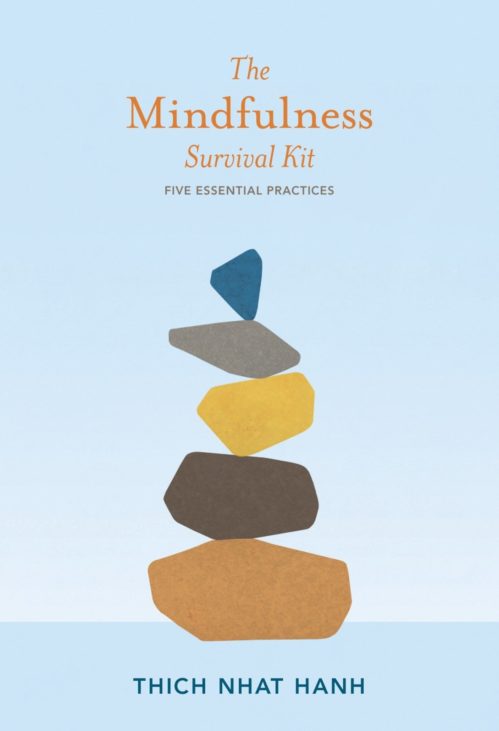This is what I heard one time when the Buddha was in the Anathapindika Monastery in the Jeta Grove near to the town of Shravasti.
That day the Buddha told the monks: “There are four kinds of nutriments which enable living beings to grow and maintain life. What are these four nutriments? The first is edible food, the second is the food of sense impressions, the third is the food of volition, and the fourth is the food of consciousness.”
“Bhikkhus, how should a practitioner regard edible food? Imagine a young couple with a baby boy whom they look after and raise with all their love. One day they decide to bring their son to another country to make their living. They have to go through the difficulties and dangers of a desert. During the journey, they run out of provisions and fall extremely hungry. There is no way out for them and they discuss the following plan: ‘We only have one son whom we love with all our heart. If we eat his flesh we shall survive and manage to overcome this dangerous situation. If we do not eat his flesh all three of us will die.’ After this discussion, they killed their son, with tears of pain and gritting their teeth they ate the flesh of their son, just so as to be able to live and come out of the desert.”
The Buddha asked: “Do you think that couple ate their son’s flesh because they wanted to enjoy its taste and because they wanted their bodies to have the nutriment that would make them more beautiful?”
The monks replied: “No, Venerable Lord.” The Buddha asked: “Were the couple forced to eat their son’s flesh in order to survive and escape from the dangers of the desert?” The monks replied: “Yes, Venerable Lord.”
The Buddha taught: “Monks, every time we ingest edible food, we should train ourselves to look at it as our son’s flesh. If we meditate on it in this way we shall have clear insight and understanding, which puts an end to misperceptions about edible food and our attachment to sensual pleasures will dissolve. Once the attachment to sensual pleasures is transformed there are no longer any internal formations concerning the five objects of sensual pleasure in the noble disciple who applies himself to the training and the practice. When the internal formations still bind us we have to keep returning to this world.
“How should the practitioner meditate on the food of sense impressions? Imagine a cow which has lost its skin. Wherever it goes the insects and maggots which live in the earth, in the dust and on the vegetation attach themselves to the cow and suck its blood. If the cow lies on the earth, the maggots in the earth will attach themselves to it and feed off of it. If she goes down into the water, the insects in the water will attach themselves to it and feed off of it. If she stands in the open space, the insects in the air will attach themselves to it and feed off of it. Whether lying down or standing up, the cow will be irritated and suffer pain. When you ingest the food of sense impressions, you should practice to see it in this light. You will have insight and understanding which puts an end to misperceptions concerning the food of sense impressions. When you have this insight you will no longer be attached to the three kinds of feeling. When no longer attached to the three kinds of feeling, the noble disciple does not need to strive anymore because whatever needs to be done has already been done.
“How should the practitioner meditate on the food of volition? Imagine there is a village or a large town near to a pit of burning charcoal. There are only the smokeless, glowing embers left. Now there is an intelligent man with enough wisdom who does not want to suffer and only wants happiness and peace. He does not want to die and he only wants to live. He thinks: ‘Over there the heat is very great, although there is no smoke and there are no flames. Still, if I have to go into that pit there is no doubt that I shall die.’ Knowing this he is determined to leave that large town or that village and go somewhere else. Practitioners should meditate like this on the food of volition. Meditating like this they will have insight and understanding which puts an end to misperceptions about the food of volition. When they arrive at that understanding the three kinds of craving will be ended. When these three cravings are ended, the noble disciple who trains and practices will have no more work to do, because whatever needs to be done has already been done.
“How should the practitioner meditate on the food of consciousness? Imagine that the soldiers of the king have arrested a criminal. They bind him and bring him to the king. Because he has committed theft he is punished by people piercing his body with three hundred knives. He is assailed by fear and pain all day and all night. Practitioners should regard the food of consciousness in this light. If they do they will realize a clear insight and understanding of the food of consciousness. When they have this insight and understanding about the food of consciousness, then they will realize insight and clear understanding about the psychesoma. When they have insight and clear understanding about the psychesoma, noble disciples who train and practice will not need to strive anymore because whatever needs to be done has been done.”
When the Buddha had spoken, the monks were very happy to put the teachings into practice.
Translated by Thich Nhat Hanh from the Samyukta Āgama 373, Puttamamsa Sutta, Saṃyutta Nikāya 12.63






Join the conversation